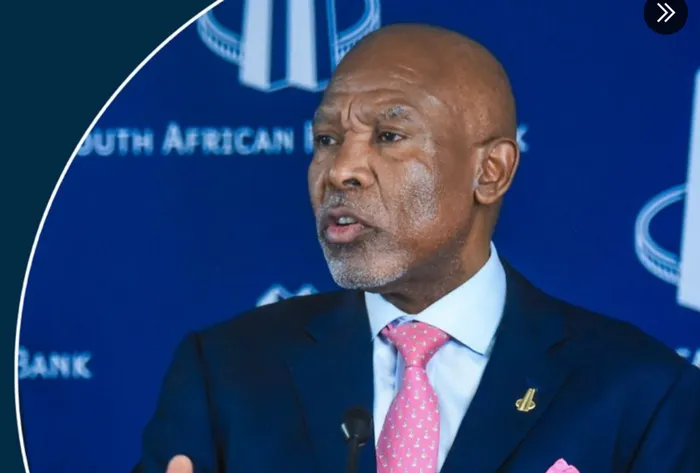
, Governor of the South African Reserve Bank, cited rising inflation as one of the reasons for keeping interest rates unchanged.
Image: SA Reserve Bank.
The South African Reserve Bank’s (Sarb) Monetary Policy Committee (MPC) has kept the repo rate unchanged at 7%, Governor Lesetja Kganyago announced on Thursday, citing rising inflation pressures.
The decision that saw four members of the MPC preferring to keep rates on hold while two favoured a cut of 25 basis points, drew mixed reactions from economists, business leaders and labour unions.
Kganyago said global conditions remain broadly supportive of emerging markets, with easing monetary policy in the US and UK, a weaker dollar and firmer commodity prices offset by ongoing geopolitical tensions.
Domestically, headline inflation has picked up in recent months, mainly due to higher food and fuel costs.
“The pressure is coming mainly from meat and vegetables, as well as fuel prices, which have been declining at a slower pace than they were before. Meanwhile, underlying inflation remains contained, with core around 3%," Kganyago said.
"Inflation expectations also moderated further in the latest survey, which shows South Africans are getting used to lower inflation. We anticipate that headline inflation will rise over the next few months, peaking at around 4%.”
Since September 2024, the Sarb has cut rates by 125 basis points.
Kganyago said the MPC now wants to assess the impact of earlier cuts on the economy before moving further. The Sarb expects headline inflation to average 3.4% this year, and 3.6% next year, before reverting to 3% during 2027.
NWU Business School economist, Prof Raymond Parsons, said the pause was widely expected.
“The MPC saw the risks around the inflation outlook as balanced, and inflation as now contained. It predicted headline inflation as averaging out at 3.4% in 2025, with core inflation around 3%.
Frank Blackmore, lead economist at KPMG, said Sarb’s stance was aimed at anchoring inflation closer to 3%.
“They believe it is beneficial to maintain consistency at the lower end of the target range. In other words, to keep inflation closer to 3% rather than 4.5%. To achieve this meaningfully, inflation expectations need to shift downwards from around 4.5% to 3%. Recent surveys indicate some progress,” Blackmore said.
From the property sector, Adrian Goslett, CEO of REMAX Southern Africa, called the decision “disappointing” for households still under financial strain.
“Consumer budgets are still stretched owing to slow economic growth. Even a small rate cut could have provided a welcome buffer for homeowners and potential buyers alike,” Goslett said.
Seeff chairperson, Samuel Seeff, argued it was a “missed opportunity” to stimulate the economy.
“This is particularly disappointing given that the US Fed announced a rate cut of 25 basis points yesterday. Based on the currently favourable economic fundamentals, there was ample room for the Bank to provide another rate cut," he said.
Labour expressed frustration, with Cosatu’s Matthew Parks saying workers had been denied breathing space amid rising living costs.
“This was an unnecessary missed opportunity to give workers and the economy badly needed relief,” Parks said.
FNB CEO Harry Kellan said that in making their decision today, the Sarb was maintaining stability and balancing this requirement with wider economic considerations of sustainable growth.
“Keeping rates steady provides stability at a time when global and domestic conditions remain uncertain.”
Efficient Group economist, Dawie Roodt, said he expected a cut but noted Sarb’s determination to force inflation towards 3%.
“Due to actual inflation and inflation expectations coming lower, and the fact that the Americans cut, they decided not to cut rates. And it's only one vote, and it could have gone to the other side," Roodt said.
"I don't know what Governor Kganyago would have voted for, but he will have the final say. But knowing him, I think he probably would have voted to keep rates unchanged. It is very clear that this fight between the Reserve Bank and the Minister of Finance was won by the Reserve Bank because clearly they're going to force inflation down to 3%.”
BUSINESS REPORT